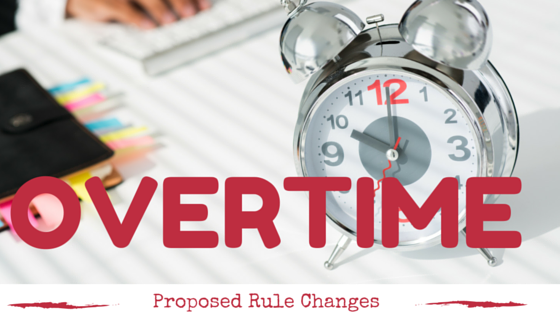
As a reminder, the federal government has a proposal to amend the overtime regulations that are currently in place. In November, 2015 we offered a live webinar that detailed the current regs, myths and the proposed changes. That webinar is recorded and can be accessed via this link, New Proposed Overtime Regulations –
Here are some highlights from that presentation and links to the government’s site, Dept. Of Labor, regarding these regulations:
Myths:
- All employees receiving a fixed salary are exempt from overtime.
- So long as employers comply with the Federal Fair Labor Standards Act (FLSA), they cannot be liable for unpaid overtime.
Current Regulations under the Fair Labor Standards Act (FLSA):
- Employers must pay non-exempt employees time and one-half for all hours worked over 40 in a given work week.
- Employees are exempt from overtime if they:
- receive a minimum salary of $455 per week
- are paid on a “Salary Basis”
- satisfy one or more of the “White Collar” exemptions
Proposed FLSA amendments:
- Raise the minimum salary under the Salary Basis test from $455/wk ($23,660/yr) to $970/wk ($50,440/yr).
- Will be indexed thereafter so that it automatically increases each year
- Target: 40th percentile of earnings of full-time salaried workers
- Increase the annual, minimum compensation for the Highly Compensated Employee exemption from $100,000 to $122,128.
- While the Department of Labor has indicated that it has no intent to change the following, it has asked for comments on whether:
- any of the duties tests under the “White Collar” exemptions should be modified
- a quantitative test (e.g., 50% of working time) should be added to the definition of “primary duty”
- employers can credit non-discretionary bonuses and commissions toward the minimum salary requirement
The Potential Impact:
- More than 5 million workers will become eligible for overtime
- More than 50% of employees in eight states will become eligible:
- Arkansas
- Florida
- Louisiana
- Mississippi
- North Carolina
- Oklahoma
- Tennessee
- West Virginia
- Some employees will consider being classified as non-exempt to be a demotion (punch a time card, etc.)
- Can lead to litigation of past practices
Timing:
Final Rule not expected until mid-2016, but timing impacted by:
- 2016 Presidential Race
- November 2016 Congressional elections
- Potential litigation
- Almost every rule proposed by the DoL during the Obama Administration has been challenged in court
How can an employer prepare?
- Identify those employees currently classified as exempt but making less than $970/week and determine:
- cost impact of classifying as non-exempt
- cost impact of keeping as exempt, but raising salaries to minimum level
- whether other exemptions may apply, particularly those not utilizing the Salary Basis test
- Seek legal guidance from a qualified attorney
Where can more information be found?
- FAQ’s on the DOL site found here, FREQUENTLY ASKED QUESTIONS: Overtime-Notice of Proposed Rule Making
- Where can I find the earnings information the Department used in setting the salary and total annual compensation levels?
- The Department set these levels using Bureau of Labor Statistics (BLS) data available at http://www.bls.gov/cps/research_nonhourly_earnings_2013.htm . On a quarterly basis, BLS publishes a table of deciles of the weekly wages of full-time salaried workers, calculated using Current Population Survey data. See http://www.bls.gov/cps/research_series_earnings_nonhourly_workers.htm
- Questions and Answers about Overtime Pay
